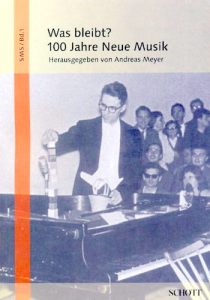Karlheinz Stockhausen’s Telemusik represents an effort to create universally valid music.
In an analogy to Le Corbusier’s modulor concept, Telemusik is based on a proportional framework constructed on the Fibonacci series, through which so-called Klangobjekte—both found sounds and electronically modulated ones of the most diverse ethnic provenance—acquire musical form.
Still, the limits of the universalism sought by Stockhausen are seen in conspicuous traces of Western compositional practice.
This according to “Universalismus und Exotik in Karlheinz Stockhausens Telemusik” by Peter W. Schatt (Musica: Zweimonatsschrift XLIII/4 [Juli-August 1989] pp. 315–20).
Today would have been Stockhausen’s 90th birthday! Above, the composer around the time of Telemusik; below, the work in question.




